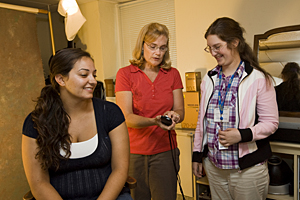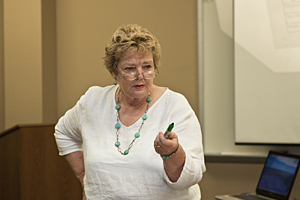

ADVERTISEMENT
- Rozovsky wins prestigious NSF Early Career Award
- UD students meet alumni, experience 'closing bell' at NYSE
- Newark Police seek assistance in identifying suspects in robbery
- Rivlin says bipartisan budget action, stronger budget rules key to reversing debt
- Stink bugs shouldn't pose problem until late summer
- Gao to honor Placido Domingo in Washington performance
- Adopt-A-Highway project keeps Lewes road clean
- WVUD's Radiothon fundraiser runs April 1-10
- W.D. Snodgrass Symposium to honor Pulitzer winner
- New guide helps cancer patients manage symptoms
- UD in the News, March 25, 2011
- For the Record, March 25, 2011
- Public opinion expert discusses world views of U.S. in Global Agenda series
- Congressional delegation, dean laud Center for Community Research and Service program
- Center for Political Communication sets symposium on politics, entertainment
- Students work to raise funds, awareness of domestic violence
- Equestrian team wins regional championship in Western riding
- Markell, Harker stress importance of agriculture to Delaware's economy
- Carol A. Ammon MBA Case Competition winners announced
- Prof presents blood-clotting studies at Gordon Research Conference
- Sexual Assault Awareness Month events, programs announced
- Stay connected with Sea Grant, CEOE e-newsletter
- A message to UD regarding the tragedy in Japan
- More News >>
- March 31-May 14: REP stages Neil Simon's 'The Good Doctor'
- April 2: Newark plans annual 'wine and dine'
- April 5: Expert perspective on U.S. health care
- April 5: Comedian Ace Guillen to visit Scrounge
- April 6, May 4: School of Nursing sponsors research lecture series
- April 6-May 4: Confucius Institute presents Chinese Film Series on Wednesdays
- April 6: IPCC's Pachauri to discuss sustainable development in DENIN Dialogue Series
- April 7: 'WVUDstock' radiothon concert announced
- April 8: English Language Institute presents 'Arts in Translation'
- April 9: Green and Healthy Living Expo planned at The Bob
- April 9: Center for Political Communication to host Onion editor
- April 10: Alumni Easter Egg-stravaganza planned
- April 11: CDS session to focus on visual assistive technologies
- April 12: T.J. Stiles to speak at UDLA annual dinner
- April 15, 16: Annual UD push lawnmower tune-up scheduled
- April 15, 16: Master Players series presents iMusic 4, China Magpie
- April 15, 16: Delaware Symphony, UD chorus to perform Mahler work
- April 18: Former NFL Coach Bill Cowher featured in UD Speaks
- April 21-24: Sesame Street Live brings Elmo and friends to The Bob
- April 30: Save the date for Ag Day 2011 at UD
- April 30: Symposium to consider 'Frontiers at the Chemistry-Biology Interface'
- April 30-May 1: Relay for Life set at Delaware Field House
- May 4: Delaware Membrane Protein Symposium announced
- May 5: Northwestern University's Leon Keer to deliver Kerr lecture
- May 7: Women's volleyball team to host second annual Spring Fling
- Through May 3: SPPA announces speakers for 10th annual lecture series
- Through May 4: Global Agenda sees U.S. through others' eyes; World Bank president to speak
- Through May 4: 'Research on Race, Ethnicity, Culture' topic of series
- Through May 9: Black American Studies announces lecture series
- Through May 11: 'Challenges in Jewish Culture' lecture series announced
- Through May 11: Area Studies research featured in speaker series
- Through June 5: 'Andy Warhol: Behind the Camera' on view in Old College Gallery
- Through July 15: 'Bodyscapes' on view at Mechanical Hall Gallery
- More What's Happening >>
- UD calendar >>
- Middle States evaluation team on campus April 5
- Phipps named HR Liaison of the Quarter
- Senior wins iPad for participating in assessment study
- April 19: Procurement Services schedules information sessions
- UD Bookstore announces spring break hours
- HealthyU Wellness Program encourages employees to 'Step into Spring'
- April 8-29: Faculty roundtable series considers student engagement
- GRE is changing; learn more at April 15 info session
- April 30: UD Evening with Blue Rocks set for employees
- Morris Library to be open 24/7 during final exams
- More Campus FYI >>
2:22 p.m., Aug. 4, 2010----The University of Delaware's Center for Disabilities Studies held its 2010 Summer Transition Education Program (STEP) last month, providing an interactive weeklong college experience for young adults with disabilities ages 16-21.
STEP uses a “person-centered philosophy” to help participants identify personal goals in areas such as interpersonal life skills, leisure and career exploration, post secondary education and advocacy.
This year, STEP hosted 11 students with disabilities who worked closely with UD coaches throughout the week and who also took advantage of exciting externships, including one with the staff of Gov. Jack Markell.
Deborah Bain, project leader for the Center for Disabilities Studies who directs STEP, says students benefit because the program helps them “begin their path to greater independence by accepting ownership and responsibility for the choices they make. During STEP students learn those essential skills for transition to adulthood -- decision-making, brainstorming options and evaluating options. They learn how to plan and strategize and solicit those necessary to serve as a support network.”
Michele Sands, director of the dissemination and advocacy unit at the center, says the students “definitely benefit from the person-centered approach. Everything is customized to each student's needs.”
Sands says that an almost universal goal of the students is to be independent, and that one of the first questions that is asked of the students when they arrive is, “How can you get from where you are now to where you want to be?”
Externships prove beneficial
One of the main ways the program helps students learn to work independently is through externships. This year, five of the students participated in externships, which allows them hands-on experience in the world of work. One worked with WVUD, while another worked with staff from the office of Gov. Markell and New Castle County Executive Chris Coons. Still another learned about the world of photography from a UD staff photographer.
Bain says externships “are a critical piece of this year's program. Capitalizing on the hopes and dreams of the students and connecting real experiences that allow for full exposure and involvement have proven to be a critical force in helping students to identify their personal path to success.”
UD students serve as coaches
Not only do the students benefit from the experience of participating in STEP, their coaches do, as well.
This year, four UD students served as STEP coaches -- Ilana Berman, a senior Honors Program student majoring in psychology; Michele Pedicone, a senior elementary teacher education major; Nathan Cunningham, a junior human services major; and Katie Biddle, a senior human services major. All four have minors in disabilities studies.
Says Sands of the coaches' involvement, “It gives them a real hands-on experience. They get a lot of training, learning how to be a coach, how to work with the students. They're interested in this (disabilities) in general, but they only have the theory, they don't have the practice. Most of them don't have the hands-on experience. This really gives them the opportunity to see if this is something they're interested in doing.”
Bain adds that the coaches “set the stage for the students' realizing their potential -- with constant support and positive reinforcement students test the waters and realize success” and that “for those planning a career in the field of disabilities, this is the place to be.”
Perspectives of STEP coaches
“The focus of my position was to support students in making decisions,” Berman says. “The coaches encouraged the students to identify their options, explore natural consequences of their actions, and practice problem solving skills to make their own decisions. Making mistakes is OK -- it provides a valuable learning experience.”
Berman adds her favorite part of STEP was “being able to build trusting relationships with each of the students. The framework of the program allowed each of the students to establish a comfort zone, where they could explore and find themselves. Working with the students one on one allowed me the chance to understand what type of supports they required. This allowed me to coach them from where they were to where they wanted to be.”
Pedicone says the most important aspect of the STEP program is having the students “actually be away from parents and be independent for a week with other college students around. It is so easy -- for myself, as well -- to lean on mom and dad and allow them to do certain tasks for us. However, when you are being independent in a college-like situation, you can really develop your own skills and grow into yourself more.”
Cunningham says he enjoyed “the bonds and friendships formed with the students. Many of the students are close to my age. This allowed us to relate together very well. It was also great to see where the students want to go in life and using the 'PATH' to see how realistic all their goals are.”
Cunningham explains that the PATH, which stands for Planning Alternative Tomorrow with Hope, is “a tool used by the Center for Disabilities Studies in which students can map out their goals and dreams in life, and then go step by step to see what they need to do to reach these goals. It focuses on what you're doing now to reach your goals, who can help you reach these goals, and certain things you can do within the next 3 months, 6 months, and 12 months to reach all of these goals. The PATH is an awesome tool and allows us, the coaches and parents, to see what we can do to assist our students to reach their goals.”
Weeks after the program ended, the students and coaches are still actively communicating daily. “Personally, I receive several texts a day from the students. Some have questions, others just want to keep in touch. It was an awesome week and a terrific program,” Cunningham says.
Article by Adam Thomas
Photos by Ambre Alexander



